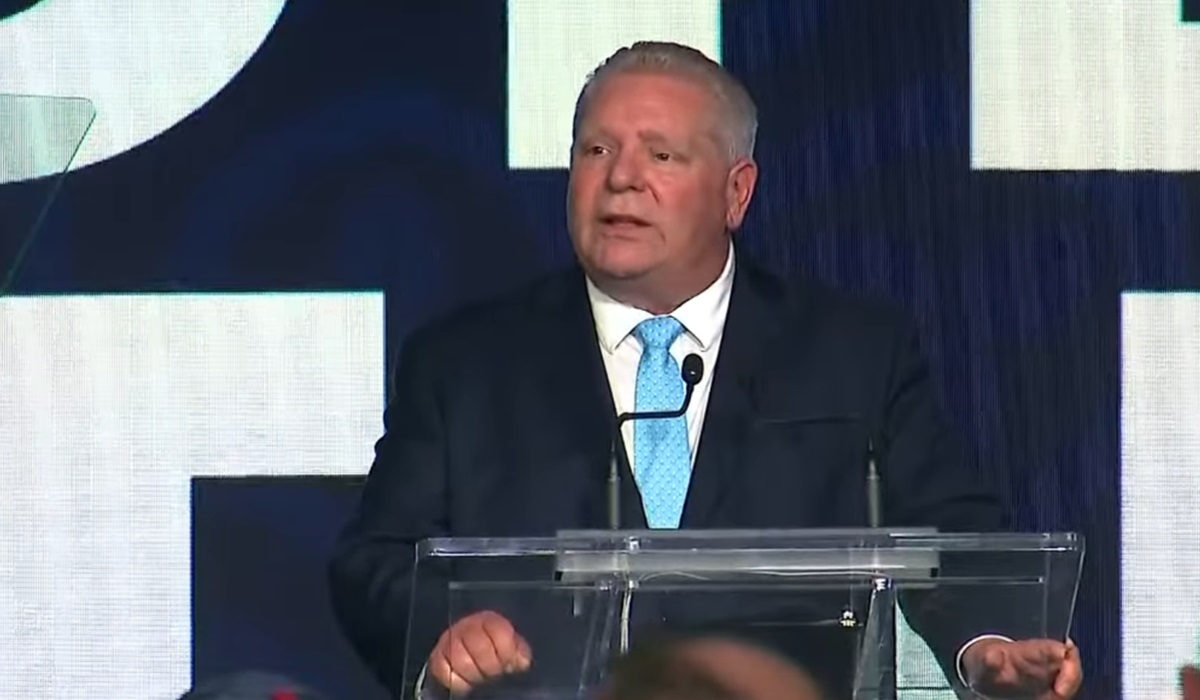Ontario’s Blue Wave: Doug Ford’s Conservatives Secure Third Majority, Signaling a Political Shift
- Ingrid Jones
- Breaking News
- February 28, 2025

Last night, Ontario voters sent a clear and resounding message: the province is firmly Conservative territory. Doug Ford’s Progressive Conservative Party secured an embarrassing supermajority win, marking their third consecutive victory in the provincial election. Despite years of relentless negative media coverage, scandals, and fierce opposition from political rivals, Ford’s government not only survived but thrived, solidifying its dominance in Ontario’s political landscape. This victory isn’t just a win for Ford—it’s a seismic shift in Ontario’s political identity and a harbinger of what’s to come in the upcoming federal elections.
Doug Ford’s success is due to his ability to connect with Ontarians on a visceral level. Much like his late brother, Rob Ford, the former mayor of Toronto, Doug has cultivated a reputation as a “man of the people.” His straightforward, no-nonsense approach resonates with voters who feel alienated by the polished, often out-of-touch rhetoric of traditional politicians. Ford’s promise to cut taxes, reduce government waste, and prioritize economic growth has struck a chord with a province weary of bureaucratic inefficiency and soaring costs of living.
The media’s relentless criticism of Ford—ranging from his handling of the pandemic to his environmental policies—seems to have done little to dent his popularity. If anything, it may have bolstered his image as a leader willing to take on the establishment. Ontarians have consistently shown that they like the Fords, flaws and all. Last night’s victory is a clear indication that Ford’s brand of populist conservatism is here to stay.
The Collapse of the Liberals and the NDP’s Uphill Battle
While Ford’s Conservatives celebrated, the Liberal Party faced yet another humiliating defeat, further cementing their status as a dying breed in Ontario politics. Once a dominant force in the province, the Liberals have been reduced to a shadow of their former selves. Their inability to present a compelling vision or connect with voters has left them irrelevant in a province that has clearly moved on. The message from last night’s election is unmistakable: nobody wants the Liberals anymore.
The New Democratic Party (NDP), led by Marit Stiles, fared slightly better but still fell far short of posing a serious threat to Ford’s Conservatives. While the NDP managed to hold onto some key ridings, their inability to make significant gains highlights the challenges they face in broadening their appeal. For the NDP to become a viable alternative, they must find a way to resonate with a broader swath of the electorate, particularly in suburban and rural areas where Ford’s Conservatives have solidified their base.
A Foreshadowing of Federal Politics?
Last night’s election wasn’t just a provincial affair—it was a preview of what could unfold in the next federal election. The overwhelming rejection of left-leaning policies in Ontario signals a growing appetite for conservative governance at all levels. The so-called “Blue Wave” that began with Ford’s first victory in 2018 is no longer a wave—it’s a permanent fixture in Ontario’s political landscape. Conservatives have set up shop, and they’re not going anywhere.
This shift has significant implications for federal politics. Prime Minister Justin Trudeau’s Liberal government, already struggling with declining popularity, should take note. Ontario’s rejection of left-leaning policies is a clear indication that Canadians are growing tired of the status quo. The Conservative Party of Canada, under Pierre Poilievre’s leadership, is poised to capitalize on this momentum. If last night’s election is any indication, the Liberals could be in for a rude awakening in the next federal contest.
Ford as a Counterbalance to Trump-Style Politics
One of the most intriguing aspects of Ford’s appeal is his ability to navigate the turbulent waters of modern conservatism without fully embracing the divisive, Trump-style politics that have dominated the United States. While Ford has been compared to Trump in his populist approach, he has managed to maintain a more pragmatic and less polarizing image. This has allowed him to appeal to a broad coalition of voters, including those who might otherwise shy away from conservative candidates.
Ford’s success in standing up to Trump during contentious negotiations over trade and border issues further bolstered his reputation as a strong leader. In a world where conservative politics is often associated with chaos and extremism, Ford has emerged as a steady hand, capable of delivering results without the drama.
The Blue Wave is Here to Stay
Last night’s election wasn’t just a wake-up call—it was a declaration that Ontario is a Conservative stronghold. Doug Ford’s majority victory is can be creditit to his appeal and the effectiveness of his policies. It’s also a stark reminder that the Liberals are no longer a viable force in Ontario politics, and the NDP has a long way to go before it can challenge the Conservatives’ dominance.
As the province looks ahead to the next federal election, the message is clear: the Blue Wave isn’t just a passing trend—it’s a permanent shift in the political landscape. Conservatives have set up tents, and they’re ready to stay. For the Liberals and the NDP, the road to relevance is long and uncertain. But for Doug Ford and the Progressive Conservatives, the future has never looked brighter.








